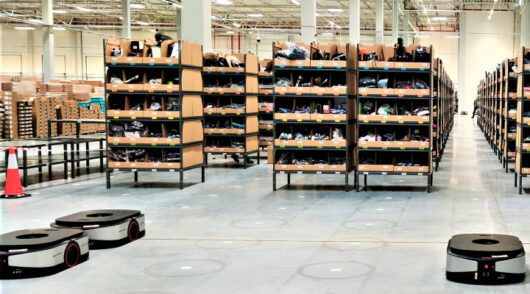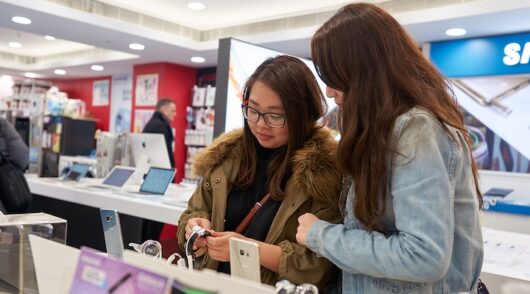Long recognised globally for its expertise in cash handling equipment, Glory is stepping into a new chapter.
During the past two years, the company has been bedding down two significant acquisitions – Acrelec and Flooid – which are re-shaping how it works with customers in its three core pillars: Banking, retailing and food & beverage.
Acrelec is all about automation: Self-checkouts, self-ordering kiosks, and drive-thru solutions in fast-paced environments like food and retail, where consumers can breeze through their transactions, trusting the systems and feeling confident every step of the way that they will get exactly what they order and the payment will be processed smoothly and accurately. Acrelec’s 20 years of expertise in developing kiosks and self-service machines made the company a perfect acquisition, especially given the long relationship between the companies.
The Flooid platform enables retailers to deliver seamless, consistent experiences across all channels – whether online, in-store, or at the pump. Designed for flexibility, its technology can scale to meet the needs of growing businesses while integrating seamlessly with existing systems. From advanced point-of-sale capabilities to omnichannel commerce and self-service solutions, Flooid’s technology empowers retailers to meet customer demands with speed and efficiency.
Seamless, secure transactions
Combining the skills of these three distinctly complementary businesses has created a business far greater than the three individual entities, explains Toshimitsu Yoshinari, CEO and chairman of Glory international business.
As Yoshinari explains, it enables Glory to move between its three core business pillars of banking, retailing and food and beverage seamlessly.
“Adding Glory cash technology to Acrelec kiosks increases the order size and staff happiness because the customer flow is much better. So we are seeing a win for our customers and our customers’ customers when you then apply that in the self-checkout world.
“Driven by the objective and benefits of modularity, Flooid has invested heavily in the evolutionary aspects required to make the platform truly composable. We are using broad resources to expand the Flooid portfolio internationally,” says Yoshinari.
Through integrating the three businesses’ core competencies, Glory can enable innovation to scale.
“We can help businesses start anywhere and scale from there without limits. Our technology is designed to grow with companies, eliminating the headaches of siloed solutions and incompatible systems.
“It’s not just about technology; it’s about how technology drives success – whether through smoother transactions, improved efficiency, or enabling growth.”
“We think the theme that connects all these brands is that they are all focused on critical moments in retail,” says Ben Thorpe, MD of Glory Asia Pacific. “The checkout is where the journey ends, but the experience lasts. Whether it’s the ease of ordering at a self-service kiosk, the speed of an automated checkout, or the reassurance of secure banking in unexpected places, we help deliver experiences that feel seamless and stress-free. Within our subsidiaries Acrelec, Flooid and shared banking network OneBanx, we’re making sure these moments go even further.”
Creating exceptional moments in retail
Thorpe says that when you combine Acrelec’s innovations, Flooid’s seamless integration and Glory’s industry expertise, every interaction becomes an opportunity to create exceptional moments in retail. “At Glory, we believe that trust isn’t built, it’s engineered. Whether it’s the simplicity of placing an order in a restaurant, the ease of completing a payment in a store, or the quiet confidence of secure banking in unexpected places, every interaction should feel effortless, secure, and built around customers’ needs – wherever and however it happens.”
It’s a timely solution in a retail business era where customers expect increased automation and convenience, as well as the certainty of secure transactions.
Trust takes a long time to earn and can be easily broken, further Yoshinari. “So in an era where significant technology is happening, it is vital to join those dots. That’s why I think Glory is in a really strong position, having migrated and moved into these adjacent business areas.”
Yoshinari says customers and the retail environment have been changing, especially after Covid, and the speed of change is growing faster and faster. Glory recognised it needed to help its retail customers meet the new consumer needs.
“Our core business is automating processes: Self-service transactions and cash management onsite for all types of retail stores, food and beverage outlets, fast-food stores or bank branches.”
Thorpe says cash has not disappeared completely, and as long as cash remains in stores, Glory’s business customers need cash handling equipment. But at the same time, those retailers are looking at other transactional solutions like the self-service ordering kiosks in many fast-food restaurants, self-checkouts at apparel or grocery stores, and systems to manage payments by mobile phones or QR codes.
“We decided we needed to shift our focus and priority to allow our customers to meet their customers’ priorities.”
Yoshinari says that while cash management was Glory’s core business for decades, even within the field of cash management, there are trends towards more self-service solutions, especially in banking and ATMs. “We recognised the importance of self-service because, even at retail checkouts, self-checkout is popular now.”
It helps that Glory’s three primary customer pillars are increasingly working together. For example, supermarkets and convenience stores are starting to offer financial services such as bill payments, currency exchange and mobile phone top-ups.
Where once Glory had different solutions for each customer pillar, the company is now increasingly mixing up those technical solutions, says Thorpe.
“The idea of using kiosks as a gateway into so much more empowers the trust between the consumer and the institution, and whatever other institution they have. It’s threading these things together, and being able to capitalise on the phygital, where the physical and the digital come together. So we see these opportunities where you have a combined commerce platform, with kiosks and cash technology to ensure that that experience works for different people,” concludes Thorpe.
“We see real-world results in what we’re doing. So that has an impact on our customers and the end user. People don’t know we are in the background making it happen – it’s seamless, fluid, and ensuring that that success happens almost without people understanding it.”






